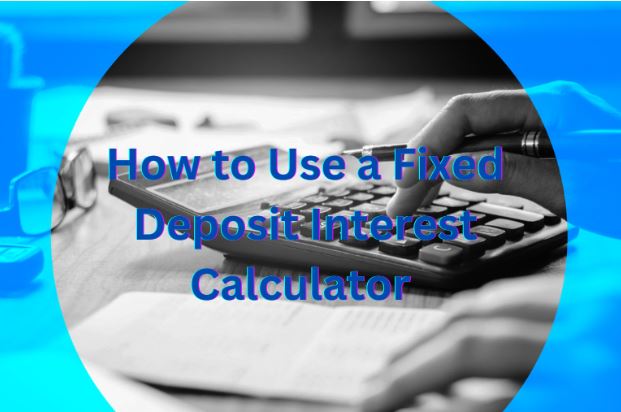Fixed Deposit is a popular investment choice in India celebrated for its safety, flexibility, and attractive returns. Since the interest rates offered by Bank FDs are fixed for the investment duration, investors can estimate their earnings at the time of investment itself. In such a scenario, a fixed deposit interest calculator becomes an essential tool that makes these estimations simpler and more accurate.
Understanding the Role of a Fixed Deposit Interest Calculator
A fixed deposit interest calculator is an online device that guarantees precise, swift, and clear results. It promptly calculates the maturity amount (the sum payable at the end of the tenure, composed of principal and interest), based on the principal amount (the initial invested money), tenure, and interest rate. To put it simply, it enables investors to foresee their investment outcome. While FD interest for senior citizens is often higher, their calculations can be concluded with the same tool.
How to Use a Fixed Deposit Interest Calculator Effectively
To achieve maximum returns using a fixed deposit interest calculator, let’s understand the process:
1. Choose the Right Type of FD:
In cumulative FD, the interest is compounded annually or quarterly and paid at the end of the tenure. In non-cumulative FD, the interest is disbursed at the intervals chosen.
2. Input Correct Details:
Precise calculation demands precise inputs. You should know your principal amount, tenure, and interest rate. Remember, the interest rate for FD varies with tenure, bank, and the chosen type of FD. For senior citizens, it is generally higher.
For instance, suppose Mr. Sharma decides to invest Rs.5 Lakhs in a cumulative FD. The bank offers an annual interest rate of 7%. He chooses a tenure of 5 years. Now, using these values in the fixed deposit interest calculator, we get the maturity amount as Rs.7,04,485.
3. Compare Different Banks:
To get maximum returns, you need the best interest rates. Different banks provide different interest rates. Some banks offer a higher FD interest for senior citizen. Use the fixed deposit interest calculator to compare the maturity amounts from different banks and select the one offering the best returns.
4. Plan Your Investment:
With the results, you can adjust your investment plan. You can change the tenure or principal amount for desired returns.
5. Income Tax Implication:
While the calculator gives the gross maturity amount, keep in mind the income tax implications. The interest earned on FD is taxable if it exceeds Rs. 40,000 in a financial year. For senior citizens, this limit is Rs. 50,000.
6. Reinvest:
Consider reinvesting in a new FD when your FD matures. It will let your money grow.
Investment, especially in financial markets, demands understanding and careful planning. The fixed deposit interest calculator scaffolds this planning, simplifying the calculation part, giving investors more time for strategic thinking.
DISCLAIMER:
This article aims to offer informational assistance to investors and does not constitute financial advice. Every investor should meticulously perceive the advantages and disadvantages of trading in the Indian financial market. They should conduct their thorough research, consult financial advisors, and not rely solely on tools like a fixed deposit interest calculator.
Summary:
Investment in Fixed Deposit guarantees safety and attractive returns. A fixed deposit interest calculator aids in predicting the result of this investment. It instantly calculates the maturity amount from the invested amount, the interest rate, and the tenure. The path to achieve maximum returns demands precise inputs about the FD, comparison of interest rates from different banks, adjustment in the investment plan according to the results, and calculating keeping tax implications in mind. The interest from FD is taxable if it surpasses Rs. 40,000 for regular citizens and Rs. 50,000 for senior citizens in a financial year. It is obligatory for an investor to understand the pros and cons of trading in the India financial market, do extensive research, maybe consult a financial advisor, and not wholly depend on the fixed deposit interest calculator for decision-making.
